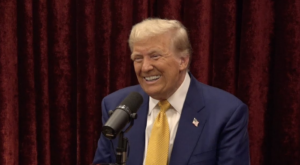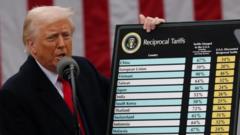President Trump's recent tariff announcement has prompted European officials to finalize retaliatory tariffs aimed at minimizing economic fallout while maximizing pressure on U.S. exporters. A voting session is expected this week as the EU plans a progressive response to the ongoing trade disputes.
European Union Prepares Retaliatory Tariffs Against U.S. Trade Measures

European Union Prepares Retaliatory Tariffs Against U.S. Trade Measures
As tensions escalate in a trade war initiated by new U.S. tariffs, the European Union is set to vote on a list of countermeasures targeting American goods.
In response to President Trump's recent declaration of a 20 percent tariff on imports from the European Union, the EU is poised to undertake its first series of countermeasures in an escalating trade conflict. The upcoming vote among EU officials will review a list of proposed retaliatory tariffs, expected to be finalized by April 15.
The announcement from the U.S. sparked immediate concern among the EU's 27 member nations, highlighting the deepening rift between these traditionally aligned partners. The EU's list of tariffs is extensive, potentially impacting a wide array of products, from whiskey and motorcycles to soybeans and boats, as officials navigate their response to previous steel and aluminum tariffs the U.S. imposed.
The strategy underpinning Europe’s action is twofold. Officials are carefully deliberating their response to maximize the effects on the U.S. economy while limiting the adverse impacts on European consumers and businesses. They are also examining other sectors affected by the new U.S. tariffs, particularly the automotive industry, which is crucial for several European economies.
EU leaders are implementing a phased approach to their retaliatory actions, allowing time for increased analysis of the implications stemming from Washington's abrupt policy changes. This preparation underscores Europe's aim to craft a measured response to existing and potential U.S. trade policies, aiming for a balanced outcome amid rising tensions in global trade relations.




















